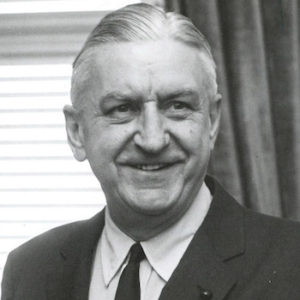
George P. Marshall
*George P. Marshall was born on this date in 1896. He was a white-American businessman and segregationist.
George Preston Marshall was born in Grafton, West Virginia, where his parents, Thomas Hildebrand Marshall and Blanche Preston Marshall, owned the local newspaper. When he was a teenager, his family moved to Washington, D.C., after his father bought a laundromat business there. He attended Friends Select School, played baseball, and then briefly attended Randolph–Mon College before quitting school at 18.
He pursued acting and was an extra for a local theater, but he was drafted into World War I, although he did not leave the country. He was discharged from the Army in December 1918. Upon his father's death in 1919, he took over the 2-store laundromat business. In 1926, he financed the Washington Palace Five basketball team. The team folded in 1928. In 1920, Marshall married Elizabeth Morton, a former Ziegfeld Follies girl. They had two children, Catherine and George P. Jr., who separated in 1928 and divorced in 1935. His mistress in the 1920s and 1930s was silent screen actress and Ziegfeld Follies dancer Louise Brooks. She called him "Wet Wash" because he owned a laundry chain. He was married to film actress-author Corinne Griffith from 1936 to 1957. She referred to him in print as "The Marshall without a plan."
In 1932, he and three other partners were awarded an NFL franchise for Boston. The team was known as the Boston Braves, as it played on the same field as baseball's Boston Braves. After the team incurred a $46,000 loss in its first season, Marshall's partners sold their interests to him. In 1933, he moved the team from Braves Field to Fenway Park, which the team shared with the Boston Red Sox. He hired coach "Lone Star" William Henry Dietz, who claimed to be part Sioux and changed the team's name from the Braves to the Redskins. Marshall said he chose the name so the team could keep its Native American logos. 1946, he sold the laundromat business, having grown it to 57 locations.
In the 1950s, Marshall was the first NFL owner to embrace television. In 1960, Marshall opposed the addition of the Dallas Cowboys to the NFL, ending his team's stature as the only team south of the Mason–Dixon line. He only agreed to the addition after a rival acquired the rights to the fight song from the music writer and threatened to prohibit the team from playing it at games. In 1960, Marshall sold 25% of the team to Jack Kent Cooke for $350,000. Marshall was extremely frugal and did not let the team spend money on travel expenses and salaries.
As a result of a "gentlemen's agreement" promoted by Marshall, NFL teams did not sign black players until 1946, when two teams broke the agreement. Marshall refused to do so, claiming that integrating the team would cause the team to lose fans in the Southern United States, and his team was the southernmost team in the NFL. He said, "We'll start signing Negroes when the Harlem Globetrotters start signing whites." Marshall downplayed the issue of integration, saying, "I am surprised that with the world on the brink of another war, they are worried about whether or not a Negro is going to play for the Redskins" and doubted that "the government had the right to tell the showman how to cast the play."
Marshall had a long-running feud with Redskin's shareholder Harry Wismer, who favored integration. In 1962, United States Secretary of the Interior Stewart Udall, and Attorney General Robert F. Kennedy issued an ultimatum. Unless Marshall signed a Black player, the government would revoke the Redskins' 30-year lease on D.C. Stadium (later known as RFK Memorial Stadium), which had been paid for by government money and owned by the city government.
Marshall selected Ernie Davis, Syracuse University's black All-American running back, as his top draft choice in the 1962 NFL Draft. However, Davis refused to play for the team and was traded to the Cleveland Browns for All-Pro Bobby Mitchell, who became the first African American to play a game for the Redskins. Marshall became an enthusiastic supporter of Mitchell. The Redskins only had three winning seasons in the 23 years between the 1946 integration of the NFL and Marshall's death in 1969. On a television show, Oscar Levant asked Marshall if he was anti-Semitic, to which he responded: "Oh no, I love Jews, especially when they're customers."
In August 1962, he underwent surgery to correct a hernia. Later, he suffered a cerebral thrombosis. In 1963, soon after his induction into the Pro Football Hall of Fame, Marshall suffered a debilitating stroke that left him legally incompetent to manage his affairs. Three conservators were assigned to manage the football team: C. Leo DeOrsey owned 13% of the team, Edward Bennett Williams and Milton W. King owned 5%. Marshall's children sued to get control of the team but lost. On August 9, 1969, Marshall died in his sleep at his home in Georgetown from a heart condition compounded by diabetes and arteriosclerosis. His funeral was at the Washington National Cathedral, with a huge crowd in attendance.
In June 2020, his statue was removed from the grounds of RFK Stadium after it was defaced and vandalized following the George Floyd protests. The same month, his name was removed from the team's Ring of Fame at FedEx Field. The team deleted all references to him on their website and removed his name from the history wall at its training facility in Ashburn, Virginia. The George Preston Marshall Foundation serves the interests of children in the Washington metropolitan area. Marshall added a caveat that no money from the foundation would ever go toward "any purpose which supports the principle of racial integration in any form"; however, this requirement was thrown out by the courts.